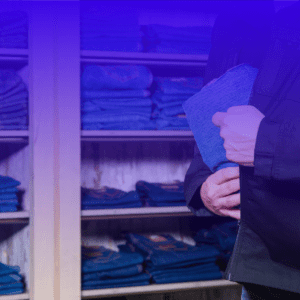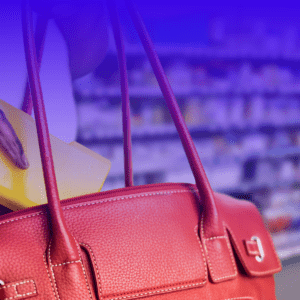






Retailers across the UK are increasingly turning to advanced technology to protect their stock, their customers and their bottom line after incidences of shoplifting reached epidemic proportions.
A recent British Retail Consortium survey revealed the cost of theft doubled to £1.8 billion in 2022/23 with 45,000 incidents every day and there has been a 50% increase in levels of retail violence and abuse to 1,300 incidents a day.
According to IT company Barron McCann, which looks after technology used by leading retail and hospitality chains, innovative solutions using artificial intelligence and biometric analytics are reshaping the way retailers detect and prevent theft.
The family-owned company, which is based at The Meteor Centre, operates across 17 countries and is responsible for the installation, of technology in thousands of stores.
It has recently installed an end-to-end solution in Brighton and Hove Albion Football Club which allows fans to purchase a pint and a pie within just 30 seconds.
The frictionless retail store is fully automated and allows fans to walk up, scan their card or phone, grab what they want and then simply walk out to complete their purchase.
The tech, commissioned by Sodexo Live! and produced by AiFi, uses AI-powered computer vision to create an avatar for each individual shopper, track them around the store and recognise the products they have taken. Sales director Gary Piper believes these innovations will continue apace utilising the existing CCTV in stores currently used to profile customers.
He said: “CCTV is far more encompassing than many shoppers realise. It can integrate with software to see how busy a certain aisle is which helps with stock and inventory management. It can also check how busy a certain square footage might be to calculate the dwell time of customers. This allows for the calculation of product placement and positioning to optimise sales.
This kind of customer-centric analysis has been going on for some time, but the technology is becoming more intelligent. The tools will recognise your profile, not necessarily using facial recognition but also what age bracket you are in and in some stores the electronic signage can even change to reflect the profile you fit.
The innovative technology that we are installing today can link the cameras to the sales going through the tills. This means that the cameras will know what items you have and recognise what’s being put through the till – if those two things don’t marry up it can provide alerts to help staff identify and take action. AI is used within security systems to learn what is classed as ‘normal’ and ‘abnormal’ behaviour. As it learns over time, it gets stronger and learns and adapts its algorithms based on user behaviour patterns.
In some instances, the software can even recognise certain gestures deemed suspicious and notify store employees in about 15 seconds by sending out a video alert of the suspicious activity, so they can identify perpetrators. We are also providing headsets and body cameras to help improve employee safety too.”
Radio Frequency Identification (RFID) technology has been used by companies including Tesco and H&M for some time, helping to improve inventory accuracy, reduce shrinkage and optimise supply chains.
But this technology is now also being leveraged to combat theft with RFID tags sewn into clothes and embedded in products, allowing retailers and their AI systems, to track items in real time as they move through the store. These tags can trigger alarms if an item is taken out of the store without being properly checked out.
Decathlon has been utilising this technology since 2008 and now other retailers are adopting smart tags that go beyond basic RFID. These tags can monitor changes in temperature, motion, or pressure, providing additional layers of security. For example, a smart tag could detect if a high-value item is being tampered with or moved in an unusual manner, triggering an alert before the item is stolen.
Supermarkets, which experience high foot traffic and handle a vast array of products, face unique challenges in preventing theft.
Gary added: “Scan and go is a really speedy way of shopping and the technology is just around the corner where customers will simply place their trolley into a bay before they leave the supermarket and in less than four seconds the contents of the trolley will be scanned and verified by the weight before taking payment of the transaction.
“If this proves to be successful, I can see this being rolled out in every supermarket. It’s a great example of how technology is continually trying to keep up with consumer demand and convenience in physical stores.”
 The cutting-edge solutions being utilised vary depending on the size of the store, the throughput of the customer and the different sectors they are operating in.
The cutting-edge solutions being utilised vary depending on the size of the store, the throughput of the customer and the different sectors they are operating in.
For smaller stores, there are other solutions available such as a small format self-service checkout that uses camera technology to pick up whether people are actively holding things in their hands and not scanning them. It can also identify whether they are putting them in their pocket without scanning them.
Some luxury retailers are implementing biometric systems, such as fingerprint or retina scanners, at store entrances or specific high-value sections within the store. These systems ensure that only authorised individuals, such as staff or pre-approved customers, can access these areas, significantly reducing the risk of theft.
Technology is also increasing employee safety with headsets and body cameras increasingly being provided to staff.
Gary added: “We are installing more and more headsets in retail stores to help increase employee safety. Front-line workers can instantly communicate with their teams and identify suspicious activity in real-time, creating open lines of communication and support. “The key to successful implementation lies in finding the right balance between security and delivering a great customer experience. Retailers have to ensure that their loss prevention measures don’t alienate customers or compromise privacy.
“One thing is for sure, as theft tactics continue to evolve, so too will the technologies designed to combat them. The future of retail security lies in a multilateral approach, combining the latest in AI, biometric data, RFID, and smart systems to create a seamless and secure shopping environment for both customers and front-line retail staff.”

Sales Director, Barron McCann
